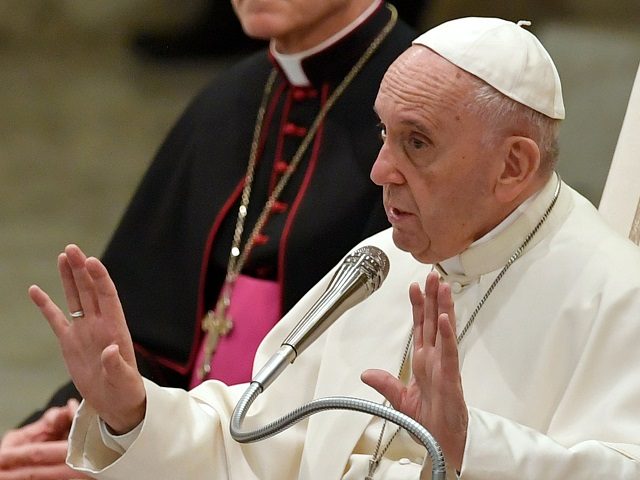Vatican Refuses to Disavow Pope’s Alleged Denial
Post# of 52065
< >

In reaction to reports that Pope Francis has denied the existence of hell, the Vatican has released a carefully worded statement that does not refute the substance of the claims.
“The Holy Father Francis recently received the founder of the newspaper La Repubblica in a private meeting for the occasion of Easter, without giving him an interview,” the unsigned March 29 Vatican statement begins.
“What is reported by the author in today’s article is the result of his reconstruction, in which the pope’s exact words are not cited. No quotation of the aforementioned article must therefore be considered as a faithful transcription of the Holy Father’s words,” the statement concludes.
In other words, the Vatican denies that the article contains a faithful transcription of the pope’s “exact words” without taking issue with the basic content of the conversation. What is interesting is what is not said. The statement does not say that the author’s reconstruction of the conversation is erroneous, and nor does it deny that the pope said that hell does not exist.
The media saga began on Wednesday, when La Repubblica printed an article saying that the pope had expressly denied the existence of hell and the immortality of the human soul in a recent conversation with his longtime friend, Eugenio Scalfari, founder of the newspaper.
The informal interview between the pope and Scalfari carried the headline: “The Pope: ‘It is an honor to be called a revolutionary.’”
Scalfari, an atheist, reportedly asked the pope about his theories regarding creation and eternal life.
“Your Holiness, in our previous meeting you told me that our species will disappear in a certain moment and that God, still out of his creative force, will create new species. You have never spoken to me about the souls who died in sin and will go to hell to suffer for eternity. You have, however, spoken to me of good souls, admitted to the contemplation of God. But what about bad souls? Where are they punished?” the paper reports.
In response, Pope Francis is quoted as denying hell, in what the Vatican statement has referred to as a “reconstruction” of the conversation between the two men.
“They are not punished. Those who repent obtain God’s forgiveness and enter the rank of the souls who contemplate him, but those who do not repent, and cannot therefore be forgiven, disappear. There is no hell, there is the disappearance of sinful souls,” the pope is reported as saying.
The Catholic Church clearly asserts the existence of hell, as the Catechism of the Catholic Church states:
The teaching of the Church affirms the existence of hell and its eternity. Immediately after death the souls of those who die in a state of mortal sin descend into hell, where they suffer the punishments of hell, “eternal fire.” The chief punishment of hell is eternal separation from God, in whom alone man can possess the life and happiness for which he was created and for which he longs.
The Catechism further declares:
The affirmations of Sacred Scripture and the teachings of the Church on the subject of hell are a call to the responsibility incumbent upon man to make use of his freedom in view of his eternal destiny. They are at the same time an urgent call to conversion: “Enter by the narrow gate; for the gate is wide and the way is easy, that leads to destruction, and those who enter by it are many. For the gate is narrow and the way is hard, that leads to life, and those who find it are few.”
On numerous occasions, Pope Francis has downplayed the importance of doctrine, the official teaching of the Church on matters of faith and morals. Being a Christian does not mean primarily “adhering to a certain doctrine,” Francis has said, but rather in binding one’s life to the person of Jesus. He has often criticized whose who insist on right doctrine as being “rigid,” “pharisaical,” and “legalistic.”
The pope has, however, said he believes everything in the Christian creed and would be ready to recite it if needed.
He also clearly believes in the devil, and has often insisted that Satan is not just a myth but a real person, a fallen angel.
Over the years of his pontificate, the pope has given a number of informal interviews to Mr. Scalfari and it has been generally understood that he uses this vehicle to get his ideas out, especially more controversial ones, while always maintaining a certain degree of plausible deniability if something Scalfari relates causes problems.
After one such papal interview with Scalfari in 2013, veteran Vatican analyst John L. Allen offered advice as to how these conversations should be read. He noted that though the words may not always be precise (since Scalfari does not record his conversations or take notes, but recreates them from memory), the content is generally trustworthy.
“Look, Italian journalism has many strengths, but a passion for factual accuracy is not among them. It is what it is,” Allen said.
“The takeaway is, the big picture is accurate,” he said. “I don’t think, in any fundamental way, he misrepresented the pope’s thought. But I also think it’s impossible to know where Francis ends and Scalfari begins, at the level of detail. I would just be very careful. I, myself, will not take any direct quotes out of that interview and present them as coming from the pope.”
 (0)
(0) (0)
(0)